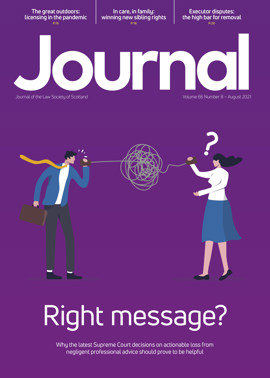President's column: August 2021
I'm at a party (remember those?) and introduced to a stranger as a criminal lawyer. What often follows is a question about how I can live with myself “defending the guilty”. The answer, which may seem obvious when explained, is that I don’t defend the guilty – I defend the innocent. That’s what the presumption of innocence means. That’s a good thing, and a cornerstone of a civilised society that respects the rule of law. Right?
An accused person, in whatever situation, is not convicted on an allegation. There’s a process: that may involve a trial with evidence led and, in more serious cases, a jury. In many cases an accused may accept their guilt, to whatever extent, and a trial will not be needed. When that happens, the “guilty” are entitled to representation to ensure a just and proportionate outcome. But what about those accused who deny their guilt and go to trial?
In Scotland we have a proud tradition of independent prosecution in the public interest. An accuser need only make a statement of complaint to the police, who will investigate before reporting the matter for consideration of prosecution to the Crown Office & Procurator Fiscal Service. It would be wrong to require the complainer to prosecute their own case, and surely impartial justice is preferable to a lynch mob. Inevitably witnesses require to give evidence and that will never be a welcome experience for them, but arrangements to provide support will be made.
However, not every complaint of criminality is well founded. There are any number of reasons why, but experience tells us that human beings, accused and accusers, are not infallible. People can get things wrong. Some exaggerate. Some lie.
If a case goes to trial, it is the jury’s responsibility to determine guilt. That is their role, their role alone and their only role. The suggestion that any category of trials has a “low conviction rate” is an oxymoron. The conviction rate is the result of individual cases, each prosecuted with the resources of the state to an eventual outcome. Frankly, to say otherwise is as much an insult to those good people who give of their time to perform public service as jurors, as to those able advocates depute and procurators fiscal who prosecute.
Sexual crime is particularly abhorrent. Society could not perpetuate without consensual sexual interaction and it is, perhaps, that fact which makes sexual wrongdoing provoke in us all particular revulsion, and particular compassion towards the victims. But, what about the presumption of innocence? How can we label a complainer a victim while the accused is presumed innocent? Well, that’s not easy, but we do, and we have to be very careful.
Juries aren’t asked to determine the accused’s innocence. They are directed that, if a majority of their 15 decide in favour of a guilty verdict, they will convict. That is a bare majority determining proof of guilt beyond reasonable doubt. If eight of the 15 are not so decided, they must acquit – in effect confirming the presumption of innocence which has been maintained – but they can return a verdict of not guilty or not proven.
We cannot know exactly how juries go about their work. We must have faith in them doing so as directed by the judge or sheriff, consistent with an oath to “well and truly try the accused and return a verdict in accordance with the evidence”. What we do know is that our justice system, with checks and balances, has been developed wisely and has stood the test of time. Behavioural research of mock jurors also shows that removing the availability of not proven would incline individual jurors towards a guilty verdict. But if an accused is presumed innocent and the Crown has to prove guilt, why would anyone want to make a change which would alter that balance?
If there is a clamour for politicians to streamline the process so that an accusation is as good as a conviction, that needs to be recognised for what it is. Or perhaps that would be a step too far, and unnecessary when all that is required is a “delivering for victims” message. There is nothing ambiguous about the words “not proven”. There is no basis for saying those words are other than well understood by juries, and that they will be yesterday, today and tomorrow.
In the 1964 appeal of Hugh McNicol, Lord Clyde said that for over 200 years the not proven verdict had been available as a third voice in the law of Scotland and, in his view, no convincing argument had been advanced to justify its destruction. Has that changed in the last 50 years? Who knows, but the very recent survey of the profession suggests there is strong support for its retention.
None of us wants to be the victim of a crime, but nor would we want to be an accused who is presumed guilty. Perhaps by writing in this column I am preaching to the converted, but at least it is good to know that we are on the same page.
Regulars
Features
Briefings
- Criminal court: Sentencing deconstructed
- Family: Litigation and lottery wins
- Human rights: Reinforcing the right to be forgotten
- Pensions: Plugging the LGPS exit credit hole
- Criminal law: The future of sexual offence trials
- Scottish Solicitors' Discipline Tribunal
- Property: Heat networks: the key to low-carbon heating?
- In-house: Power of the nudge






